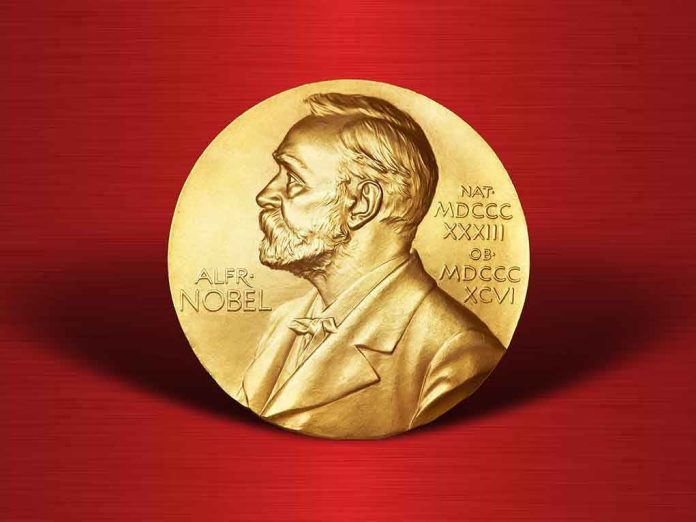
In a move that has stunned both supporters and detractors, Pakistan announced it will nominate former President Donald Trump for the Nobel Peace Prize—for the second time—citing his alleged role in brokering a ceasefire in the Gaza conflict, a region long considered a diplomatic minefield.
Story Highlights
- Pakistan’s Foreign Ministry publicly declared its intent to nominate Trump for the Nobel Peace Prize, pointing to his purported behind-the-scenes influence in securing a Gaza ceasefire.
- This marks the second such nomination push from Pakistan, following a similar gesture after the Abraham Accords in 2020, despite Trump’s history of never making the Nobel shortlist.
- The announcement has triggered international debate, with critics questioning the depth of Trump’s involvement and the durability of the ceasefire, even as supporters hail a potential diplomatic breakthrough.
- Pakistan, a nation with no formal ties to Israel and strong historical support for Palestine, is using the nomination to assert its diplomatic relevance on the global stage.
- The Nobel Committee has acknowledged receipt but maintains its longstanding policy of confidentiality, leaving the public to speculate on the merits and motivations behind the nomination.
Background and Strategic Calculus
The Gaza conflict, reignited in 2023, has seen repeated cycles of violence and failed truces, drawing global condemnation and calls for decisive international mediation. Trump, out of office since 2021, reportedly engaged in backchannel negotiations between Israeli and Palestinian representatives throughout 2024 and 2025, culminating in a tentative ceasefire announced in early October 2025. Pakistan’s decision to nominate Trump is seen by regional analysts as a strategic bid to elevate its own diplomatic profile, leveraging the high visibility of the Nobel Peace Prize to signal Pakistan’s commitment to global peace efforts—despite its limited direct influence over the Israel-Palestine issue.
This is not Pakistan’s first foray into Nobel politicking: in 2020, then-Prime Minister Imran Khan publicly suggested Trump deserved the prize for the Abraham Accords. While Trump has been nominated multiple times by European parliamentarians, he has never advanced to the finalist stage, a fact that underscores both the controversial nature of his foreign policy legacy and the highly politicized environment surrounding the Nobel Peace Prize itself.
Current Developments and Global Reactions
Pakistani officials have framed Trump’s involvement as “constructive” and “pivotal,” while Trump’s office welcomed the nomination, reiterating his commitment to peace. Reactions from Israeli and Palestinian officials have been mixed: some acknowledge the value of U.S. mediation, while others downplay Trump’s role, emphasizing broader international pressure and the fragility of the current ceasefire. Media coverage has been polarized, with conservative outlets highlighting the potential for a Trump diplomatic victory and liberal critics questioning whether a temporary truce merits such high recognition, especially given the complex, unresolved roots of the Gaza conflict.
The Nobel Committee, while confirming receipt of the nomination, has stressed its independence and the confidentiality of its deliberations. Nominations are accepted until January 31, 2026, with the winner typically announced in October of that year. The Committee’s longstanding practice is not to disclose nominees for 50 years, but nominators often publicize their actions, as Pakistan has done in this case.
Impact and Implications
In the short term, Pakistan’s move has amplified its diplomatic visibility and sparked renewed debate over Trump’s legacy as a peacemaker. If the ceasefire holds, civilians in Gaza may see immediate humanitarian benefits, though the risk of renewed violence remains high. For Trump, the nomination offers a chance to burnish his post-presidential statesmanship, even as critics argue that Nobel recognition should require more than a temporary cessation of hostilities.
Longer-term, the episode raises questions about the politicization of the Nobel Peace Prize and the role of non-state actors—including former leaders—in shaping international diplomacy. It also highlights the enduring U.S. influence in Middle East peace processes, regardless of which party holds the White House. For Pakistan, the nomination is as much about signaling its aspirations on the world stage as it is about the actual prospects for peace in Gaza.
Ultimately, the story underscores how the Nobel Peace Prize remains a potent symbol in global politics, capable of generating headlines, controversy, and—occasionally—genuine hope for peace, even as the realities on the ground remain fraught and uncertain.
Sources:
BBC News. “Pakistan to Nominate Trump for Nobel Peace Prize Over Gaza Ceasefire.” October 2025.
Reuters. “Trump Welcomes Nobel Nomination for Gaza Ceasefire Role.” October 2025.
Al Jazeera. “Pakistan’s Nobel Nomination for Trump: Symbolism or Substance?” October 2025.
Dawn (Pakistan). “Foreign Ministry Announces Nobel Nomination for Trump.” October 2025.





